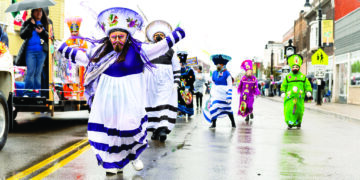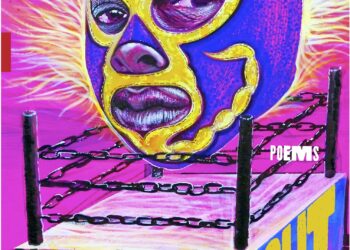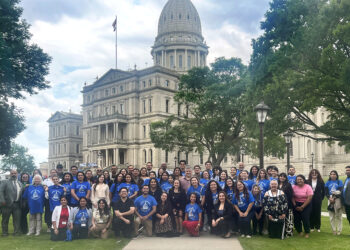Martin Solís Jr., un legendario cantante tejano, que fue incluido en el Salón de la Fama Tejano en 2017, recibirá un Marcador Histórico en el suroeste de Detroit, para honrarlo por su música.
Martin Solís, cuya familia emigró de Texas a Michigan después de la Gran Depresión, comenzó su carrera musical en la década de 1950. Comenzó a tocar con sus compañeros de banda Manuel Rivera, Rodolfo y Joe Martínez, quienes se unieron a Solís y formaron la banda, Conjunto Los Primos.
Frank Solís (hijo de Martín Solís), y su esposa Anna Solís son los fundadores de la Asociación Tejana Martin Solís Jr. Y trabajan con el Salón de la Fama de la Música de Michigan para traer un hito histórico y honrar la carrera de su padre y el Conjunto Los Primos.
La Placa se inaugurará, en el verano de 2023 en la Corporación de Desarrollo Comunitario de Mexicantown (MCDC). Kevin Hill, presidente del Salón de la Fama de la Música de Michigan, mencionó que esta Placa será la primera que se relacione con una persona de origen mexicano, en el estado de Michigan, lo cual hace de esto un momento histórico.
Solís y Hill exploraron algunos lugares diferentes, pero fue Anna Solís quien tuvo la idea de poner la placa conmemorativa en el terreno de MCDC. “Sentí que tenía que estar en el área del suroeste de Detroit, donde están todos los mexicanos. Este fue el primer lugar en el que pensé”, dijo Anna Solís.
Frank Solís contactó a Raymond Lozano, Director Ejecutivo del MCDC para colocar la Placa en su terreno. Lozano creció en el suroeste de Detroit cuando la escena musical tejana comenzó a echar raíces en la década de 1960. En 2016 se convirtió en Director Ejecutivo de MCDC, cuando la organización estaba en una “etapa inactiva”. “Cuando inicié este trabajo tenía tres objetivos y uno de ellos era hacer de esta área, un destino turístico, y pensé que (la placa) encajaría perfectamente”, dijo Lozano.
Fueron necesarios cinco años para llegar a este momento. El mayor desafío fue la pandemia de COVID-19. “Íbamos a presentar nuestro caso, desafortunadamente, la reunión se pospuso, lo que significó que se retrasó unos dos meses más”, dijo Hill.
Otro desafío al que se enfrentó el grupo fue hacer que la documentación cumpliera con los requisitos históricos. “Cuando estás armando una presentación histórica, la Comisión Histórica busca documentación verídica”, dijo Hill. La comisión busca Material de Fuente Primaria; pero en este caso particular, había mucho más material de fuentes secundarias (es decir, artículos de periódicos). “Si no tienes mucho material de fuente primaria, tienes que investigar mucho para encontrarlo”, dijo Hill.
Afortunadamente, gran parte del Material de Fuente Primaria se encontró por medio de Sally Ramon, la viuda de Roy Ramon, el propietario de Roy’s Records Shop, una tienda de música mexicana y tejana histórica pero ahora cerrada en el suroeste de Detroit.
Después de recopilar toda la información históricamente precisa, el proceso tomó otro año, antes de que alguien supiera algo sobre el progreso de la Placa de Reconocimiento Histórico.
Inspirados por el legado de su padre, Frank y Anna quieren traer de vuelta los bailes tejanos a la comunidad, a través de la Asociación Tejana Martin Solís, Jr. Lo que comenzó como una idea se ha convertido en un movimiento para honrar a una leyenda tejana y encontrar formas de retribuir a la comunidad que lo inició. “Creo que mi papá estaría muy feliz con esto. También estaría muy contento de que sus amigos estén incluidos”, dijo Frank Solís.
“Solo queremos que la comunidad se sienta orgullosa de todo lo que se ha logrado”, dijo Anna Solís.
En cuanto a Frank Solís, la historia de su padre trata de cambiar la narrativa sobre la cultura mexicana. “Quiero que los jóvenes sepan cuáles fueron las luchas de nuestro pueblo y la experiencia mexicoamericana y la música que se trajo de Texas a Michigan”, comentó.
Solís quiere que las personas comprendan, cuáles han sido las contribuciones culturales masivas hechas por personas como su padre. “Somos más que mexicanos que trabajan en el campo, somos mucho más que peones”.
Eric Guzmán se crió en las afueras de Detroit, pero tiene fuertes raíces en el área suroeste. Eric tiene una gran pasión por escribir sobre deportes, música y cultura pop. Se graduó de la Universidad de Michigan-Dearborn con una licenciatura en periodismo y se esfuerza por tener un impacto en el mundo de la multimedia.
Tejano Music Legend Martin Solis to Receive Mexicantown’s First Historic Marker
Martin Solis Jr, a legendary Tejano singer who was inducted into the Tejano Hall of Fame in 2017 will receive a historic marker in Southwest Detroit to honor the famed musician.
Martin Solis, whose family migrated from Texas to Michigan in the aftermath of the Great Depression, started his music career in the 1950s. He began playing with bandmates Manuel Rivera, and Rodolfo and Joe Martinez who sought out Solis and formed the band, Conjunto Los Primos.
Solis’ son, Frank Solis, and his wife Anna Solis, founders of the Martin Solis Jr. Tejano Association have been working with the Michigan Music Hall of Fame to bring a historical marker to honor his father’s career and the band Los Primos.
The marker will be revealed during the summer of 2023 on the grounds of the Mexicantown Community Development Corporation (MCDC). Kevin Hill, President of the Michigan Music Hall of Fame says “this marker will be the first marker to have anything to do with Mexican [ties] in the state of Michigan”, signifying just how historic of a moment this will be.
Solis and Hill scouted a few different locations but it was Anna Solis who came up with the idea to put the maker on the grounds of MCDC. “I felt that it needed to be in the Southwest Detroit area where all the Mexicans are. This was the first area I actually thought it would be a great place for,” Anna Solis said.
Frank Solis reached out to Raymond Lozano, Executive Director of the MCDC about placing the marker on their grounds. Lozano grew up in Southwest Detroit when the Tejano music scene began to take root in the 1960s. In 2016 he became the Executive Director of MCDC when the organization was in a “dormant stage.” “I had three goals [when I took this job] and one of them was to make this area a destination, and I thought [the marker] would fit perfectly,” Lozano said.
It took five years to get to this moment. The biggest challenge was the COVID-19 Pandemic. “We were going to present our [case], unfortunately, the meeting got postponed so that meant that our meeting got pushed back about two more months,” Hill said.
Another challenge the group faced was making the documentation meet historical requirements. “When you’re putting together a historical [presentation], [The Historical Commission] is looking for documentation,” Hill said. The commission is looking for what is called primary source material. In this case, there was much more secondary source material (i.e. newspaper articles). “If you don’t have a lot of [primary source material], you have to really dig to find it,” Hill said.
Luckily, a lot of the primary source material was found through Sally Ramon, the widow of Roy Ramon, the owner of Roy’s Records Shop, a storied but now closed Mexican and Tejano music store in Southwest Detroit.
After gathering all of the historically accurate information, the process took another year before anyone heard anything about the progress of the marker.
Inspired by his father’s legacy, Frank and Anna want to bring Tejano dances back to the community through the Martin Solis, Jr. Tejano Association. What started out as an idea has progressed into a movement to honor a Tejano legend and find ways to give back to the community that gave him his start. “I think [my dad] would be very happy with this. He would also be very happy his friends are included with him on this occasion,” Frank Solis said.
“We just want the community to be proud about everything that’s been accomplished,” Anna Solis said.
As for Frank Solis, his dad’s story is about changing the narrative about Mexican culture. “I want the young ones to know what the struggles were for our people and the Mexican-American experience and the music that was brought from Texas to Michigan,” he said.
Solis wants people to understand the massive cultural contributions made by people like his father. “We’re more than Mexicans who work in the fields, there’s more to us than being field hands”.
Eric Guzman was raised right outside of Detroit but has strong roots in the southwest area. Eric has a strong passion for writing about sports, music, pop culture. He graduated from The University of Michigan-Dearborn with a Bachelor of Arts degree in Journalism and strives to make an impact in the world of multimedia.
















































